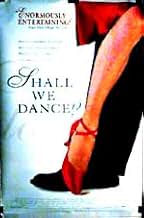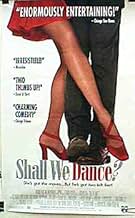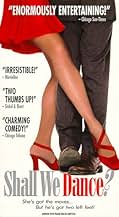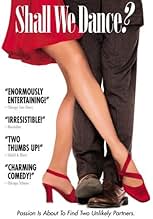ÉVALUATION IMDb
7,7/10
12 k
MA NOTE
Ajouter une intrigue dans votre langueA successful but unhappy Japanese accountant finds the missing passion in his life when he begins to secretly take ballroom dance lessons.A successful but unhappy Japanese accountant finds the missing passion in his life when he begins to secretly take ballroom dance lessons.A successful but unhappy Japanese accountant finds the missing passion in his life when he begins to secretly take ballroom dance lessons.
- Prix
- 55 victoires et 7 nominations au total
Eri Watanabe
- Toyoko Takahashi
- (as Eriko Watanabe)
Reiko Kusamura
- Tamako Tamura
- (as Raiko Kusamura)
Histoire
Le saviez-vous
- AnecdotesIn the first scene, a man's shoe in close-up plunges into a black pool in the street. This symbolizes the world renowned Ballroom Dancing Competition in Blackpool, England, referenced later in the film.
- Citations
Shohei Sugiyama: At my age, it's embarrassing to say so, but every day I feel so alive.
- Autres versionsOriginal Japanese version (pre-Miramax) runs 136 minutes and is available on Hong Kong laseridisc with English and Chinese subtitles.
Commentaire en vedette
Shohei Sugiyama is a dispirited salaryman who has lost his lust for life. Despite having a wife and daughter, a nice house and a steady job, depression grips him. One day, while riding the train home, he spots a beautiful, forlorn looking woman-Mai Kishikawa- gazing out the window of a dance studio. Although not really interested in dance, Sugiyama plucks up enough courage to take lessons in the studio, in order to get to know her. Under the tuition of the elderly Tamako Tamura, however, he begins to fall in love with dancing, finding meaning in his life once more.
Written and directed by Masayuki Suô, 'Shall We Dance?' is a heartwarming comic-drama that works on multiple levels. Funny and sad both, it can be viewed as a critique of rigid, conformist Japanese society, which is contrasted with the expressive, liberating Western dance practiced in the studio. It also shows how one's life can become better and more meaningful by following a dream or goal, and how purpose can be restored by doing so. Conversely, it also illustrates how communication and honesty are vital for relationships to prosper, shown through the clashes and confusions between Sugiyama and his wife Masako, as well as those between Mai and her old dance partner.
Above all else, it is a love letter to ballroom dancing, and those that practice it. Sugiyama's stale existence is given colour and excitement after he joins the studio. Not only does he have something to live for, but he begins meeting people who genuinely affect him. Whether it is his mentor Tamura, or his friend Tomio Aoki, everyone he meets while dancing brings something to his life, not least of which is Mai, who- perhaps inadvertently- teaches him to love again. Suô's screenplay is full of depth, as well as great, witty dialogue, and is compelling and captivating.
Naoki Kayano's cinematography is stylish and evocative, contributing to the mood of the piece. He captures the dance sequences with verve, heightening the emotion with his tracking shots and snappy zooms. He contrasts the dull, dour tones of Sugiyama's office and home with the bright, colourful hues of the dance studio and the ballroom competitions, reflecting the different worlds that Sugiyama inhabits. Lush and memorable, Kayano's work complements the graceful and energetic movements of the dancers, creating a remarkable visual spectacle.
Moreover, the expertly choreographed dancing is incredible to behold. The film makes ballroom dancing- when learnt properly- look like the most beautiful expression of emotion on earth. The soundtrack is stirring, making excellent use of songs by the likes of Rogers and Hammerstein, while Yoshikazu Suo's original score complements the narrative astutely. Furthermore, Kyôko Heya's production design- in conjunction with Kayano's visuals- is full of contrast and realism, bolstering the film's impact.
Koji Yakusho stars as Sugiyama, opposite Tamiyo Kusakari as Mai, Reiko Kusamura as Tamura and Naoto Takenaka as Aoi. Yakusho, as always, makes the character compelling and complex, bringing much humour to the role. We empathise with Sugiyama, and are on his side the whole way through. Kusakiri, a professional dancer in her first acting role, is excellent, displaying Mai's reserve and inner feelings marvellously. Kusamura nearly steals the show as the kind-hearted Tamura, while Takenaka is a source of constant delight as the Salsa-dance loving Aoi. In addition, Hideko Hara does strong work as Sugiyama's wife Masako, sharing a great chemistry with Yakusho.
In conclusion, Masayuki Suô's 'Shall We Dance?' is a delightful, funny film both poignant and powerful. With a strong screenplay full of humorous dialogue and scenes, striking cinematography and production design and a memorable score, it works on many levels. Boasting terrific performances from all in the cast- especially those of Koji Yakusho, Tamiyo Kusakiri and Reiko Kusamura- and featuring much expertly choreographed ballroom dancing, if the question is 'Shall We Dance?', the answer must surely be yes.
Written and directed by Masayuki Suô, 'Shall We Dance?' is a heartwarming comic-drama that works on multiple levels. Funny and sad both, it can be viewed as a critique of rigid, conformist Japanese society, which is contrasted with the expressive, liberating Western dance practiced in the studio. It also shows how one's life can become better and more meaningful by following a dream or goal, and how purpose can be restored by doing so. Conversely, it also illustrates how communication and honesty are vital for relationships to prosper, shown through the clashes and confusions between Sugiyama and his wife Masako, as well as those between Mai and her old dance partner.
Above all else, it is a love letter to ballroom dancing, and those that practice it. Sugiyama's stale existence is given colour and excitement after he joins the studio. Not only does he have something to live for, but he begins meeting people who genuinely affect him. Whether it is his mentor Tamura, or his friend Tomio Aoki, everyone he meets while dancing brings something to his life, not least of which is Mai, who- perhaps inadvertently- teaches him to love again. Suô's screenplay is full of depth, as well as great, witty dialogue, and is compelling and captivating.
Naoki Kayano's cinematography is stylish and evocative, contributing to the mood of the piece. He captures the dance sequences with verve, heightening the emotion with his tracking shots and snappy zooms. He contrasts the dull, dour tones of Sugiyama's office and home with the bright, colourful hues of the dance studio and the ballroom competitions, reflecting the different worlds that Sugiyama inhabits. Lush and memorable, Kayano's work complements the graceful and energetic movements of the dancers, creating a remarkable visual spectacle.
Moreover, the expertly choreographed dancing is incredible to behold. The film makes ballroom dancing- when learnt properly- look like the most beautiful expression of emotion on earth. The soundtrack is stirring, making excellent use of songs by the likes of Rogers and Hammerstein, while Yoshikazu Suo's original score complements the narrative astutely. Furthermore, Kyôko Heya's production design- in conjunction with Kayano's visuals- is full of contrast and realism, bolstering the film's impact.
Koji Yakusho stars as Sugiyama, opposite Tamiyo Kusakari as Mai, Reiko Kusamura as Tamura and Naoto Takenaka as Aoi. Yakusho, as always, makes the character compelling and complex, bringing much humour to the role. We empathise with Sugiyama, and are on his side the whole way through. Kusakiri, a professional dancer in her first acting role, is excellent, displaying Mai's reserve and inner feelings marvellously. Kusamura nearly steals the show as the kind-hearted Tamura, while Takenaka is a source of constant delight as the Salsa-dance loving Aoi. In addition, Hideko Hara does strong work as Sugiyama's wife Masako, sharing a great chemistry with Yakusho.
In conclusion, Masayuki Suô's 'Shall We Dance?' is a delightful, funny film both poignant and powerful. With a strong screenplay full of humorous dialogue and scenes, striking cinematography and production design and a memorable score, it works on many levels. Boasting terrific performances from all in the cast- especially those of Koji Yakusho, Tamiyo Kusakiri and Reiko Kusamura- and featuring much expertly choreographed ballroom dancing, if the question is 'Shall We Dance?', the answer must surely be yes.
- reelreviewsandrecommendations
- 22 janv. 2024
- Lien permanent
Meilleurs choix
Connectez-vous pour évaluer et surveiller les recommandations personnalisées
- How long is Shall We Dance??Propulsé par Alexa
Détails
Box-office
- Brut – États-Unis et Canada
- 9 499 091 $ US
- Brut – à l'échelle mondiale
- 9 499 091 $ US
Contribuer à cette page
Suggérer une modification ou ajouter du contenu manquant


























